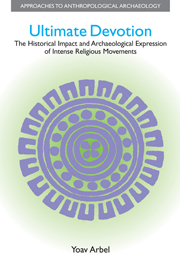 Ultimate Devotion
Ultimate Devotion from Part I
The ranks entered [Jerusalem] magnificently at the noonday hour on Friday, the day of the week when Christ redeemed the whole world on the cross. With trumpets sounding and with everything in an uproar, exclaiming: “Help God!” they vigorously pushed into the city, and straightaway raised the banner on top of the wall. All the heathen, completely terrified, changed their boldness to swift flight through the narrow streets of the quarters.
(Fulcher of Chartres, Chronicle of the First Crusade)The landscape of history is marked with the unmistakable imprints of ideology and religion. Key historical events across the globe can be credited to or blamed on the influence of religious agents, who show no signs of relinquishing their power in the foreseen future. In an era of constant scientific innovation, relentless global capitalism, and instantaneous coverage by an extensive and cynical media, much of humanity still esteems and fears supernatural forces and dedicates time, efforts, and funds to placate them. Secular ideologies based on science, social justice, or nationalism emerge and later fossilize or dissipate. Religion, like the proverbial Phoenix, even where thrown into the fires of rational thought and secular zealotry, always rises from its ashes. Its versatility and adaptability deserve much of the acclaim for its admirable survival. Religion not only has something for everyone — it is something for everyone. It balances spiritual concerns and material needs, provides moral guidance, alleviates suffering and avenges grievances. Its agents fill complex and sometimes contradictory capacities.
To save this book to your Kindle, first ensure [email protected] is added to your Approved Personal Document E-mail List under your Personal Document Settings on the Manage Your Content and Devices page of your Amazon account. Then enter the ‘name’ part of your Kindle email address below. Find out more about saving to your Kindle.
Note you can select to save to either the @free.kindle.com or @kindle.com variations. ‘@free.kindle.com’ emails are free but can only be saved to your device when it is connected to wi-fi. ‘@kindle.com’ emails can be delivered even when you are not connected to wi-fi, but note that service fees apply.
Find out more about the Kindle Personal Document Service.
To save content items to your account, please confirm that you agree to abide by our usage policies. If this is the first time you use this feature, you will be asked to authorise Cambridge Core to connect with your account. Find out more about saving content to Dropbox.
To save content items to your account, please confirm that you agree to abide by our usage policies. If this is the first time you use this feature, you will be asked to authorise Cambridge Core to connect with your account. Find out more about saving content to Google Drive.